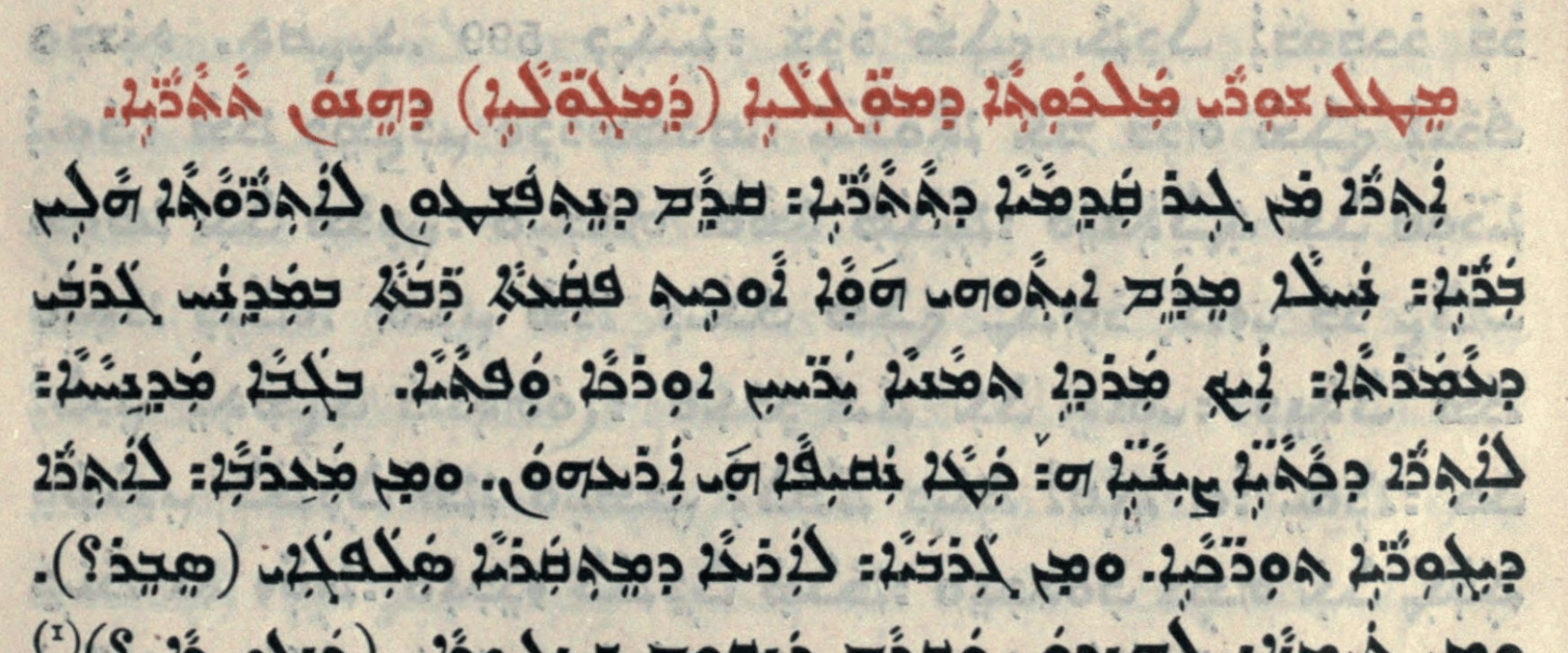What Language Did Jesus Speak? Greek? Aramaic? Hebrew? All of The ABOVE?

Written by Joshua Schachterle, Ph.D
Author | Professor | Scholar
Author | Professor | BE Contributor
Verified! See our editorial guidelines
Verified! See our guidelines
Date written: December 29th, 2023
Disclaimer: The views and opinions expressed in this article belong to the author and do not necessarily match my own. - Dr. Bart D. Ehrman
Scholars continue to speculate about what language Jesus spoke. Was it Hebrew since he was Jewish? Was it Greek since that was the language of the Gospels? Did he speak Latin since Palestine was part of the Roman Empire? In this article, I’ll explore these questions and what historians have to say about them.

What’s in a Name?
Before we look at Jesus’ language, let’s look at his name for our first clue. Scholars are clear that his given name was Yeshua, an Aramaic name, although it was probably pronounced YAY-shu. How did we get from “Yeshua” to “Jesus”?
The earliest Christian writings we have are the letters of Paul. Paul was a Jew but was born and raised outside of Palestine; he therefore spoke and wrote in Greek. Paul knew that Yeshua was Jesus’ actual name but he had to write that name in Greek for his Greek-speaking audience. Unfortunately, there is no SH- sound in Greek so Paul had to improvise (or perhaps he had seen the name written in Greek before). He wrote the name as Iesous (pronounced “YAY-soos”), adding the S sound at the end which in Greek makes the name masculine.
From Iesous, English translators eventually derived the name Jesus.
What Was the Main Spoken Language in Jesus’ Region?
Jesus was raised in a region called Galilee in Palestine in the first half of the 1st century. According to Stanley Porter, the principal spoken language of Palestine at that time was a language called Aramaic. Hebrew and Aramaic were closely related but definitely distinct.
Aramaic was originally the language of a people called the Arameans who ruled parts of Mesopotamia. According to scholar Holger Gzella, the language became more widespread when it was adopted by the Assyrian and then the Neo-Assyrian empires. By the time Jesus was born, Aramaic had been the language of Palestine for centuries.
Because of this, the vast majority of scholars agree that Jesus spoke almost exclusively in Aramaic, specifically in the Galilean dialect of Aramaic which would have been his native language.
Additionally, even though the New Testament is written entirely in Greek (more on that later), there are clues in it that point to Jesus’ original spoken language being Aramaic. This indicates that even for Greek speakers, some memories of Jesus originally included Aramaic words and phrases.
Aramaic in the New Testament
The New Testament authors transliterate, or write in their own lettering system, a few key Aramaic phrases from memories of what Jesus said. Here are some examples:
Verse | Aramaic Phrase | Meaning |
|---|---|---|
Mark 5:41 | “Talitha koum”: | “Little girl, get up!” |
Mark 7:34 | “Ephphatha”: | “Be opened!” |
Mark 14:36 | “Abba”: | “Father” |
Matthew 5:22 | “Raca”: | “Fool, or Empty Head” |
There are more, but I think you get the gist. If even these Greek-speaking authors, writing decades after Jesus’ death, preserve memories of Jesus’ speech in Aramaic, Aramaic was certainly Jesus’ primary spoken language.
Besides Jesus’ own Aramaic name and the use of some Aramaic phrases in the Gospels, the names of some of his disciples are Aramaic as well.
Peter, for example, is the Greek translation of the Aramaic “Cephas” (pronounced KAY-fahs) which means “rock.” Thomas is from the Aramaic “toma” meaning “twin” and Bartholomew comes from the Aramaic “bar-Tōlmay” which means “plowman.”
There are also place names given in Aramaic in the New Testament. The place where Judas Iscariot dies is called “Akeldama”, Aramaic for “field of blood.” The garden where Jesus prays in agony before he is arrested is called “Gethsemane”, Aramaic for “oil press” because it was on the Mount of Olives.
Finally, what language did Jesus speak on the cross? The last words Jesus speaks on the cross, according to the Gospel of Mark, are an Aramaic version of a line from Psalms 22:1: “Eloi, Eloi, lema sabachthani?” meaning “My God, my God, why have you forsaken me?”
The Psalm, like most of the Hebrew Bible, was written in Hebrew, but Mark’s version remembers (or imagines) Jesus speaking the same line in his native Aramaic. The word “Eloi,” for example, is the Aramaic version of “God.” In fact, this is probably what Jesus called God in prayer when he wasn’t addressing him with the Aramaic “Abba”, or “Father”.
Did Jesus Speak Hebrew?
Angel Saenz-Badillos notes that Hebrew stopped being an ordinary spoken language in Palestine as early as the 5th century BCE, generally replaced by Aramaic. However, Hebrew had certainly not disappeared entirely. First and foremost, Hebrew was the language of the Jewish religion.
All the books in the Hebrew Bible were written entirely in Hebrew with two exceptions: the books of Ezra and Daniel are partially written in Hebrew and partially in Aramaic.
Ezra was written around 400 BCE, under the influence of the Persians who spoke Aramaic and allowed the Israelites to rebuild Jerusalem after their exile in Babylon. This was the beginning of Aramaic becoming the spoken language in Palestine.
Daniel was written about 164 BCE, only about 160 years before the birth of Jesus. The fact that it was partially written in Aramaic offers support that Aramaic was already becoming the more common language while Hebrew was generally used for religious purposes.
However, it was very important for those who were literate – scholars and scribes, for example – to know the Hebrew language well. Even those Jews who were illiterate – probably 90% of them in Jesus’ time – had to understand some Hebrew to participate in ritual worship and to understand the Scriptures when they were read in a synagogue or the Jerusalem Temple.
So, did Jesus speak Hebrew? Most scholars agree that while he didn’t converse in it from day to day, he could certainly understand the Scriptures in Hebrew and may even have cited them in Hebrew when he preached.
Did Jesus Speak Greek?
If Jesus and his disciples were all Aramaic-speaking Jews living in Palestine, why is the entire New Testament written in Greek? Where did the Greek come from?
You may have heard of Alexander the Great, a king from the Greek kingdom known as Macedon, or Macedonia. In the 330s BCE, Alexander started a massive conquest that would include all of Greece, Persia (modern-day Iran), Asia Minor (modern-day Turkey), the Mediterranean coast, Palestine, Egypt, and even northern India.
One of the effects of this massive conquest was that Greek became the lingua franca in all those conquered regions. This means it was the language of trade and any other situation where people from different regions didn’t share native languages. Eventually, Jews outside Palestine, like the Apostle Paul, for example, often learned Greek as their first language.
This was the case with the New Testament authors. Most, if not all of them, were diaspora Jews, observing the Jewish religion in places like Asia Minor and Egypt. Greek was so common in Alexander’s empire, which later became the Roman Empire, that some scholars have surmised that Jesus would have learned and spoken at least some Greek.
Bart Ehrman disagrees with this (and so do I). This is how Bart puts it:
In Nazareth Jesus would have had zero reason to learn Greek, and probably no way to learn Greek. Rural Galilee was completely Jewish (culturally) and thoroughly Aramaic (linguistically). Even when Jesus was an adult, there is no reference to him visiting a major city (until he goes to Jerusalem at the end of his life), or speaking Greek, or knowing Greek. He was a rural Jew in the Jewish hinterlands of Galilee. He almost certainly could not speak Greek.
While it is not impossible that Jesus might have learned a few Greek phrases, even that is unlikely.

Did Jesus Speak Latin?
In 2004, Mel Gibson made a movie called The Passion of the Christ, which focused principally on a lot of invented and extra-gory details not present in the Gospel accounts of Jesus’ crucifixion. However, much of the film had Jesus speaking to his disciples in Aramaic, which was historically accurate.
But then, in the scene when he was brought before Pontius Pilate, Jesus suddenly spoke perfect Latin. The assumption, I suppose, was that since the official language of the Roman Empire was Latin and Palestine was part of the Roman Empire, Jesus had to speak Latin to converse with Pilate. Not so fast.
Bart Ehrman has a few choice words about this:
Some scholars have suggested that Jesus knew a smattering of Latin given the Roman presence in the land; but that has been shown to be almost certainly false. There were no Romans present in Jesus’ town of Nazareth, and prior to his arrival in Jerusalem the last week of his life, he probably never encountered a Roman.
Jesus almost certainly did not speak Latin. If indeed the scene between Jesus and Pilate actually happened, Pilate would certainly have had an Aramaic translator present.
Conclusion: What Was Jesus’ Everyday Language?
Jesus lived in 1st-century Palestine where Hebrew had long since ceased to be a spoken language. Instead, people in Palestine spoke Aramaic, a language closely related to Hebrew but still separate.
One of the reasons we know this is that although the New Testament was written entirely in Greek, many of the memories of Jesus include words preserved in Aramaic. These include words he spoke when he was healing and preaching.
There are also Aramaic names in the Gospels, principally the names of Jesus’ disciples, as well as Aramaic place names.
Finally, the last words of Jesus on the cross are preserved by Mark, our earliest Gospel, in Aramaic, even though they are quoting the Hebrew Bible. Aramaic was the language of Jesus.
While it’s not impossible that Jesus knew a few words in Greek, even that is improbable. Jesus was from a small, rural town in Galilee in which everyone spoke Aramaic. He had no reason and probably no way to learn Greek.
While Jesus didn’t speak Hebrew as a conversational language, he certainly understood it when it was read out loud in the Scriptures. Those who knew Hebrew best were elite scribes and scholars, neither of which describes the historical Jesus.
Finally, despite Mel Gibson’s portrayal of Jesus speaking Latin, there is almost no chance that he spoke it. Although the Roman Empire controlled Galilee, there is no evidence that Roman soldiers ever went there (Nazareth is entirely absent from most Roman maps of Palestine).
Jesus did not speak Latin. Sorry, Mel.
